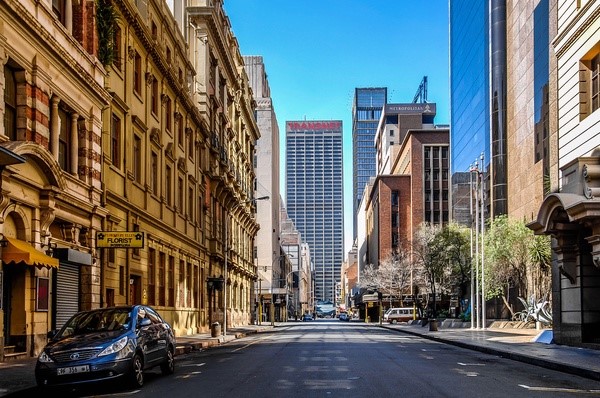Johannesburg has the largest economy of any city in sub-Saharan Africa, is home to Africa’s largest stock exchange and the headquarters for many mining companies, financial institutions and other multinationals who are active in Africa. Johannesburg remains a highly diverse city, where inequalities are very visible, in an environment of bustling multiculturalism.
Johannesburg

The city of Johannesburg was founded in 1884 after the discovery of gold, and has continued to boom, becoming the largest city in South Africa, and the biggest city in the world that is not set on water, be it sea, lake or river. The area around Johannesburg has been inhabited since before the emergence of modern humans. The city is located 25km from the ‘Cradle of Humankind’ UNESCO World Heritage Site, where large numbers of proto-human remains have been fossilised in caves.
With a population of slightly over 5.7 million people recorded in 2020 the city of Johannesburg has roughly more than size since the end of apartheid in 1994, a trend that is expected to slow, but continue (source: UN WPP). Of the population living within the Johannesburg’s city boundaries, 64% identify as black, 14% white, 14% coloured and 7% Asian (source: Stats SA). The segregation policies of apartheid led to suburbs such as Soweto and Lenasia, having very different ethnic demographics. The language most spoken is English at 31%, followed by Zulu with approximately 20%. Johannesburg has a young population, with 42% of people being under the age of twenty-four, and only 6% over sixty. There is a significant rich/poor divide largely due to the history of colonialism and apartheid, high levels of unemployment and many people living in settlements lack central municipal services.
Johannesburg is the unofficial economic capital of South Africa— a country without a single legally designated capital. The governmental branches are hosted by three cities, the executive by Pretoria, the legislative by Cape Town and the judicial branch by Bloemfontein. Johannesburg houses the Constitutional Court of South Africa.
The city’s economic strength has resulted in a thriving services industry, with banking, IT, telecommunications, media and consumer retail sectors. Johannesburg is also home to the continent’s biggest and busiest airport. Historically, mining has been of great importance to the city, but it has gradually declined owing to limited resources as well as the growth of other industries, most notably manufacturing, with heavy industries like steel and cement operating.
The current political priorities focus heavily on deploying participatory approaches to create inclusive and pro-poor economic growth and access to public infrastructure and services in a transparent and accountable manner.
Find more information on social cohesion in Johannesburg here: https://www.metropolis.org/sites/default/files/resources/Gauteng_Social-Cohesion_2019.pdf
Johannesburg is a Metropolis member: https://www.metropolis.org/member/johannesburg
Representative from the City of Johannesburg administration participated in a Metropolis pilot project, Sustainable Cities Collaboratory, in collaboration with other local governments: https://www.citiescollaboratory.org/
The Sustainable Cities Collaboratory is a practically oriented research body. It brings together the knowledge and skills of mayors, municipal officers, urban practitioners and academic researchers to develop principles and policies for good urban practice. Its role is to develop practical roadmaps for sustainable urban development in cities.
The Mayor
Dada Morero became Mayor of Johannesburg in January 2024, representing the African National Congress (ANC). Before entering city politics, he served as the ANC's Regional Secretary in Greater Johannesburg, playing a significant role in party organization and grassroots mobilization.
Morero has served on the Johannesburg City Council and held positions in local government administration. He has a background in local governance and municipal administration. He has particularly focused on issues of service delivery, housing, and urban development in Johannesburg.
Johannesburg on the use platform
Below are 3 initiatives being implemented by the City of Johannesburg administration that demonstrate effective metropolitan governance, sustainable citymaking and the localization of the SDGs.
- Separation at source programme
- The Rea Vaya (‘we are going’) Bus Rapid Transit system
- eKhaya, an urban regeneration project
eKhaya : an urban regeneration project
To find more case studies and to connect to city makers from Johannesburg, use our search function and select "Johannesburg" as the "city".
City profile
For a detailed profile on Johannesburg including population demographics, administrative structure, industry and economics, click on any of the above case studies and then select "City information".
Find out more about Johannesburg consulting Metropolis’ indicators.
These indicators on cities across Africa were in the report available here.
The former Mayor of Johannesburg, Mr. Mpho Parks Tau, contributed to Metropolis’s “voice of the Mayors” initiative.
Get involved!
Join USE (urban sustainability exchange) and support the work of municipal governments and city makers by sharing your local experience with our global audience.
Upload your case study here.
